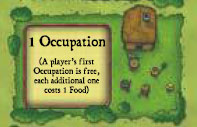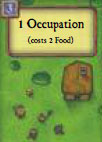At the start of the game, each player receives 7 Occupation cards and 7 Minor Improvement cards. A player who plays a card from their hand or buys a Major Improvement must read the text on the card aloud so that all the other players are aware of its effects.
Occupation cards

A player can use the 1 Occupation Action space(s) to play one of these cards face-up on the table.
On the 1 Occupation Action space that is printed on the lefthand game board, a player's first Occupation is free, and each additional Occupation costs 1 Food. In the 3-5 player game, a second Occupation space has varying costs depending on the number of players (see the appropriate Action cards).

The text on the Occupation cards applies to the player as soon as the card is played. Cards that are in a player's hand have no effect on the game.
Several cards, including the Countryman, Acrobat and Net Fisherman, are printed with a Claim symbol - if a player with one of these Occupations meets the stated condition, a Claim token is placed on the appropriate Action space with the arrow pointing towards the player with the claim.
Improvement cards
In addition to the Minor Improvements, there are also ten Major Improvement cards. In each game, different Minor Improvements will come into play, but the same Major Improvements are available in each game and may be used by any player.
The 1 Major or Minor Improvement Action space allows a player to purchase either a Major or Minor Improvement - as does the Renovation space. Minor Improvements may also be purchased - in conjunction with other actions - on the Starting player and Family growth action spaces. Players may not choose the action After Family growth, also 1 Minor Improvement and only purchase an Improvement: This card only allows an Improvement after Family growth.
The upper-right corner of an Improvement card shows its cost: goods that a player must pay in order to play the card. Grain and Vegetables that are paid must be taken from a player's supply and may not be taken directly from a field. Some Improvement cards (for example the Cooking Hearth) have a slash, showing that the player may choose between two options to pay for the Improvement.
Some Minor Improvements require the player to have a prerequisite - these are shown in the top left corner. In order to play these cards, the player must have the required goods, tiles or cards on the table in front of him or her. Of course, the condition is fulfilled if the player has more than the required number of fields or cards.
Many Minor and all Major Improvements are worth Victory Points at the end of the game. These are shown by the symbol at the left beside the picture. The Bonus Points symbol on some cards (bottom center) indicates that they also give variable Bonus points - these are described in the text on the card.
Some Minor Improvements (Traveling cards) are placed in the hand of the next player to the left after they are played and acted on. These are indicated by the brown arrows to either side of the illustration and the text on the card explains how they are used.
Some Minor Improvements are Upgrade cards. Playing these cards not only costs goods but also requires the player to return an existing played or acquired Improvement. Upgraded Major Improvements are returned to the Major Improvements board and may be bought again by any player (including the same one as before). Upgraded Minor Improvements are removed from the game.
Continue Reading


